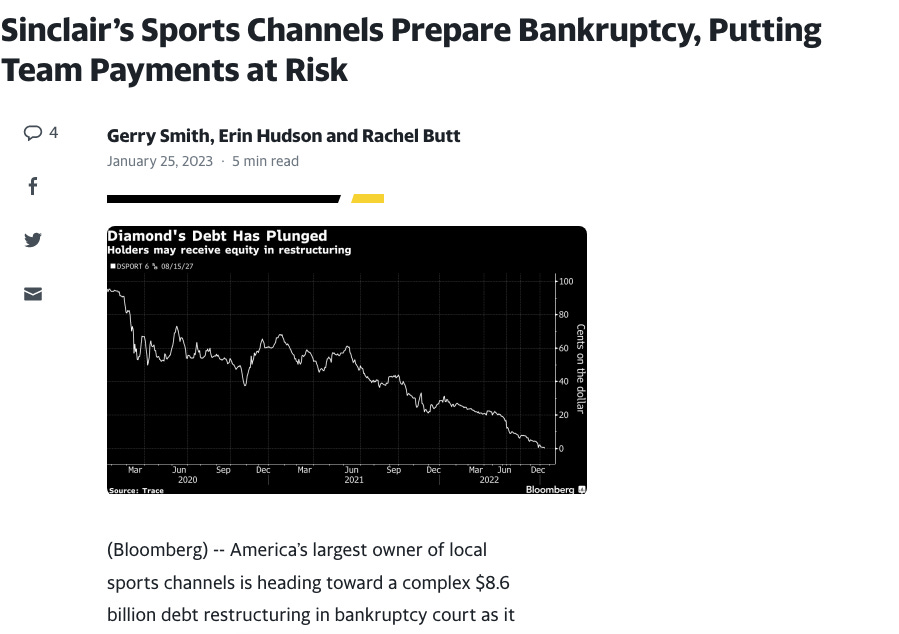The Disney-Fox Divestment Goes Bankrupt
Trump Antitrust Division chief Makan Delrahim brokered a deal to let Disney get bigger by buying Fox. And now it's all fallen apart
Welcome to BIG, a newsletter on the politics of monopoly power. If you’d like to sign up to receive issues over email, you can do so here.
As Ticketmaster screwed the pooch during the Taylor Swift ticket sales fiasco, a lot of people started asking the question - why did the Obama administration allow Live Nation and Ticketmaster to merge in the first place? And while Ticketmaster got a lot of attention, there were other disastrous mergers that were quite similar, like Albertsons and Safeway, or Hertz and Thrifty.
These were all deals where the Antitrust Division or Federal Trade Commission fostered the consolidation of an industry in return for having the combined entity spin off a line of business that enforcers thought could remedy the problem. Live Nation, for instance, had to sell off its own ticketing service, and HertzThrifty and Albertsons-Safeway had to sell some of their stores to a third party. In all three cases, the divested business failed almost immediately, and sometimes was bought back by the original monopolist.
Indeed, Obama’s antitrust officials had a penchant for turning antitrust enforcement into an exercise of deal-making instead of law enforcement. When two parties sought to merge and came to the Antitrust Division or Federal Trade Commission, they were as likely to encounter officials who sought to help them figure out how to do so as to determine whether the combination was illegal.
And this was policy. Officials thought that most mergers are actually good, and they shouldn’t stand in the way if they can help it. In 2011, Obama Antitrust Division chief Christine Varney emphasized the Department of Justice sought “tailored resolutions of competitive concerns that permit parties to proceed with parts of their transaction that do not threaten competition,” aka let firms spinoff certain lines of business if they could get the rest of the deal through. Similarly, the FTC’s Debbie Feinstein argued that the agency would be “surgical” in its approach so as to not affect the “procompetitive aspects of an arrangement.”
The result was disastrous, aka Ticketmaster. So when Trump came into office, Makan Delrahim, his antitrust chief, said he would turn the page on this method of doing business. But he did not. And now he’s got his own set of embarrassments. There is of course the Sprint-T-Mobile merger, which Delrahim oversaw. He structured an elaborate consent decree whose goal was to get DISH into the mobile phone business. It failed, and there are now three major mobile firms, instead of four, with higher prices in the industry.
Then there’s this year’s news. In 2019, Delrahim allowed Disney to buy Fox, which consolidated Hollywood and media in a way that not only allowed Disney to exercise coercive tactics towards theaters, but gave the firm power over culture in a way that conservatives now regret. This deal required a divestment of 22 regional sports networks to a Sinclair subsidiary, which borrowed a bunch of money to buy them. At the time, Delrahim argued that his deal was ‘surgical’, a word that Obama official Feinstein had also used.
You’ll never guess what happened next to regional sports programming just a few years later as a result of the high debt load.
The Biden FTC and Antitrust Division have learned from these failures. Antitrust lawyers are frustrated that they can’t negotiate settlements with the antitrust agencies, and have to go to trial. In the UnitedHealth Group-Change merger, UHG spun off a division and argued to the court that it had remedied the problem. The Antitrust Division did not accept that, and litigated. The judge ruled for UHG, but it was a matter of fact and law, not enforcers turning into dealmakers.
Similarly, the FTC has refused to impose conditions on the Microsoft-Activision deal, and simply is going to litigate. My guess is there will be a similar approach to Kroger-Albertsons. FTC Enforcement chief Holly Vedova, who has Debbie Feinstein’s job, made that explicit this week, saying "parties should expect us to be skeptical and risk-averse when considering offers to settle on our merger investigations."






Fun fact: If you have Spectrum Internet/TV service, you can also get Spectrum Mobile, which hilariously is born of a poorly negotiated agreement between Verizon/Spectrum that gives equal ownership to Verizon towers to Spectrum. Apparently, Verizon never thought Spectrum would get into the mobile business, which they have. I pay $14/mo for 1GB on the very same towers that Verizon customers use, apparently without any reduction in priority or service.
Beahvioural remedies should not even be called remedies. It's completely non-factual. They're more like pinky promises that are incredibly hard for regulators to keep track off, let alone enforce on a macroeconomic scale.